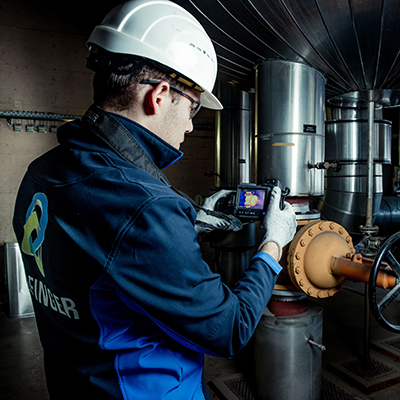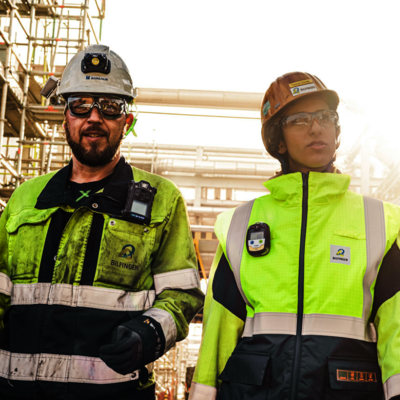
Sustainability
at Bilfinger
No. 1 in
efficiency &
sustainability
Sustainability is a significant part of our corporate strategy. To determine the essential fields of action for our own behavior, we have for years regularly conducted materiality analyses in dialog with our stakeholders. The resulting materiality matrix defines the sustainability topics of Bilfinger.
The Executive Board is responsible for sustainability. Sustainability management at Group level is coordinated and aligned with the SustaiNet sustainability network, which is coordinated by Corporate Treasury & Investor Relations under the responsibility of Executive Board member Matti Jaekel (Chief Financial Officer).
Members of SustaiNet include the heads of selected corporate departments and functional units whose areas of responsibility are related to sustainability issues (as well as managing directors of operational regional and divisional management teams).
SustaiNet meets at least twice a year as scheduled; in addition, meetings are convened on an ad-hoc and project-related basis. In addition to the formal exchange in the sustainability network, the members as well as employees in their functional areas are in regular contact on individual sustainability topics.
Bilfinger acts as a strategic partner for the process industry, delivering comprehensive services and decades of experience to help our customers achieve their sustainability goals. We are determined to become no. 1 when it comes to increasing efficiency and sustainability for our customers."
Determination of materiality
To determine the main areas of action for our own conduct, we have for years regularly conducted materiality analyses in dialog with our Group’s stakeholders. The resulting materiality matrix defines our Group’s sustainability topics.
Sustainability is a key component of our corporate strategy. We use an indicator-based approach that creates transparency both internally and externally. Further key figures have been added to the non-financial Group declaration, including the frequency of all work-related accidents and market-based measurements of CO2 emissions in accordance with the GHG Protocol. The content is now clearly divided into the areas of Environment, Social and Governance, significantly improving comparability with other companies."
Our Sustainability targets
Leading partner to enhance efficiency and sustainability of customers
Climate neutrality of GHG emissions Scope 1 and 2 by 2030 at the latest
Collect GHG emissions Scope 3 and support Science-based Targets Initiative
Occupational accidents: Zero is possible
Investment of at least 0.5 percent of the Group's revenue annually in the training and further education of employees
Conduct at least 600 internal supplier audits annually
Learn more
Becoming a leading partner for improving our customers’ efficiency and sustainability
Bilfinger has set itself the target of becoming the leading partner for our customers when it comes to enhancing the efficiency and sustainability of their plants. Increasing awareness of climate change and the ensuing energy transition in many industrialized countries are generating substantial opportunities for Bilfinger to exert influence here. The chemical & petrochemical, energy, oil & gas as well as pharma & biopharma industries are the Bilfinger Group’s largest customer groups. Given the socially and politically mandated energy transition and climate protection measures in all key stages of the value chain, they are all facing fundamental innovative leaps.
Achieve climate neutrality in terms of Scope 1 and 2 GHG emissions by 2030 at the latest
In the course of our daily work, we pay close attention to the careful use of valuable resources and address the urgent task of limiting climate change to the greatest extent possible. The focus in this regard is on efforts to reduce our own energy consumption, gradually substitute the use of fossil fuels with renewable energy sources and thus sustainably limit atmospheric pollution with harmful greenhouse gases.
Steps to reduce CO2 emissions were initiated in financial year 2022. All regions and divisions of the Group have developed concepts to reduce their respective emissions and thus the emissions of the Group as a whole from 2023 onward in accordance with the GHG (Greenhouse Gas) Protocol Scope 1 and 2. The combination of various measures for the next few years includes a shift from purchased electricity to renewable sources, gradually replacing the passenger vehicle fleet with electric vehicles as well as installing photovoltaic systems and initiating energy efficiency initiatives at our sites. In terms of GHG Protocol Scope 1 and 2 emissions caused by our operations, we have set a target of being climate neutral by 2030 at the latest. Most importantly, this includes a reduction in emissions. In the case of unavoidable emissions, compensation is also provided through the support of additional CO2-reducing projects combined with the purchase of carbon credits.
Collect data on Scope 3 GHG emissions and support Science-Based Targets Initiative
In 2022, we developed a concept for the data collection of GHG Scope 3 emissions. It calls for all other categories in the upstream value chain to be successively added in 2023. Categories of the downstream value chain will follow in 2024.
Based on the survey of Scope 1 and 2 GHG emissions as well as the complete survey of Scope 3 GHG emissions from financial year 2024, we plan to submit Bilfinger’s targeted reduction path of GHG emissions to limit global warming to a maximum of 1.5 degrees Celsius to the Science-Based Targets Initiative (SBTi) for review. The concept we developed in 2022 foresees the submission of the commitments for 2023 and the submission of the reduction plan to achieve the near-term targets by 2030 for GHG Scope 1 and 2 accordingly for 2025.
Learn more
Avoid all occupational accidents wherever possible
The physical well-being of all our employees is our top priority. For this reason, occupational safety is a crucial factor in all our activities. It is our goal to be a leader in occupational safety in our industrial sector. Our Zero is possible aspiration serves as a guideline for continuously improving occupational safety in all areas and preventing as many occupational accidents as possible.
Invest at least 0.5 percent of Group revenue annually in employee training and development
In order to maintain and further strengthen the Group’s competitiveness, we will make targeted investments of at least 0.5 percent of Group revenue per year in the training and further education of Bilfinger employees in the future. To this end, we are using a quarter of the savings generated by the efficiency program launched in 2022 in addition to the existing expenditures.
Learn more
Conduct at least 600 internal supplier audits annually to effectively meet the Group’s due diligence obligations
The Declaration of Principles on Respect for Human Rights, which took effect at Bilfinger in 2022, together with the Group’s Code of Conduct, which has been in place for many years, regulates the human rights-related principles that apply to all Bilfinger employees and suppliers. To effectively meet our due diligence obligations in the Group’s supply chain, we have set the target of conducting at least 600 internal supplier audits per year in accordance with defined standards beginning in financial year 2023.
Assessment of risks from own business operations
The identification and evaluation of risks that arise from the company’s business operations and that affect the reportable aspects are the responsibility of risk management. The focus is on the question of which risks arise from our business activities and relationships or from our products and services that have an impact on these aspects. Significant risks that are very likely to have or will have serious negative impacts on them must be reported. Reportable risks on the relevant topics were not identified.
Find the Bilfinger Group´s sustainability indicators at a glance here.





